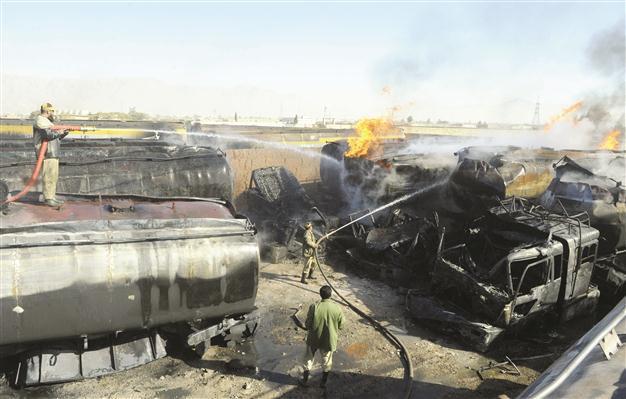NATO fuel tankers set ablaze in Pakistan
QUETTA, Pakistan

Pakistani firefighters extinguish burning NATO supply oil tankers and goods trucks at a terminal following an overnight attack by gunmen in Quetta on December 9, 2011. AFP photo
Militants destroyed at least 30 trucks on a NATO trucking terminal in southwest Pakistan in a rocket attack Dec. 8, police said. The trucks were carrying supplies to troops in neighboring Afghanistan.
Some 44 oil tankers and goods trucks were parked in the temporary terminal in Quetta after Pakistan shut down supply lines for NATO forces in anger at a deadly cross-border airstrike that killed 24 Pakistani soldiers. The attack highlighted the vulnerability of the supply trucks waiting for the country’s two border crossings into Afghanistan to reopen.
Around 40 percent of non-lethal supplies for U.S.-led troops in landlocked Afghanistan travel across Pakistani soil. Quetta Police Chief Ahsan Mehboob said only two trucks remained unaffected by the gun and rocket attack, while eight other vehicles were partially damaged. There were no casualties in the attack, he said.
Islamabad closed both frontier crossings into Afghanistan on Nov. 26, hours after airstrikes by the U.S.-led coalition killed 24 Pakistani troops on the Pakistan-Afghanistan border. U.S. and NATO officials have said the incident was a mistake and have pledged to investigate.
Meanwhile, Pakistan’s Head of Military Operations Maj. Gen. Ashfaq Nadeem told the Cabinet and the Senate’s defense committee officials believe the airstrikes were planned and speculated they may have been carried out by the CIA, according to Head of the Defense Committee Javed Ashraf Qazi Dec. 8. Nadeem said the military was considering deploying air defense weapons to the Afghan border to prevent future attacks, according to Qazi.
A report in Pakistan’s leading English-language newspaper Dawn erroneously said the military had already decided to deploy the weapons. “You cannot deploy these systems on each and every outpost. Sometimes these posts are attacked by militants, and you may lose these weapons,” said Qazi, a retired army general and former head of Pakistan’s powerful Inter-Services Intelligence agency.
Despite these risks, the defense committee was convinced the military should deploy air defense weapons to the border, said Qazi. Pakistan Army Chief Gen. Ashfaq Pervez Kayani has instructed troops on the ground they are allowed to strike back against any future incursions without prior approval of top commanders, Qazi quoted Nadeem as saying.
Mosque bombing in AfghanistanMeanwhile, a suicide bomber blew himself up Dec. 9 at a mosque in northeast Afghanistan, killing four people, including a local police chief, authorities said. The bombing occurred around 2 p.m. in the yard of a mosque in Ghazi Abad district of Kunar province after Friday prayers, said provincial Police Chief Gen. Ewaz Mohammad Naziri. Naziri said the district police chief, his bodyguard, a civilian and an employee of the Afghan intelligence service died in the attack and five others were wounded.
The Taliban have claimed responsibility for the attack. Kunar has been a flashpoint in the Taliban’s 10-year insurgency against the Western-backed government and 140,000 U.S.-led foreign troops. Spokesman for the militia Zabiullah Mujahid claimed in a text message to reporters the district police chief had been the target of the attack and “six policemen” had been killed.
The Taliban are known to frequently exaggerate and distort their claims in relation to attacks. The attack came three days after coordinated attacks on Shiite Muslims in the capital Kabul and the northern city of Mazar-i-Sharif killed at least 59 people in an unprecedented assault on the holy day of Ashura.
Compiled from AFP, AP and Reuters stories by the Daily News staff
